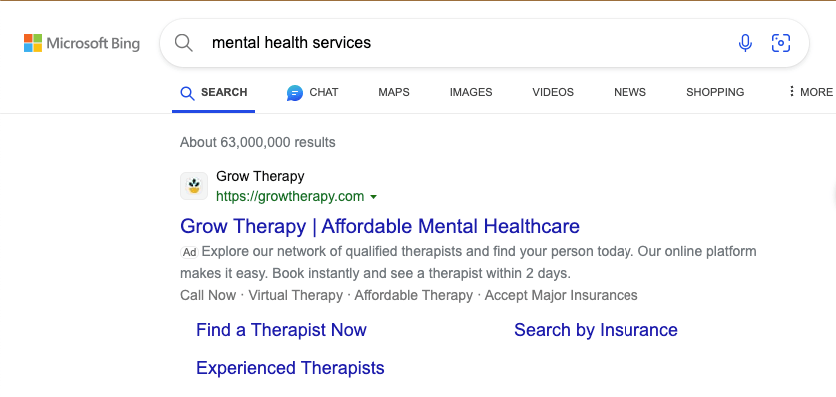- Home
- Industries
- Health
- Mental & Behavioral Health ppc for mental and behavioral health
5 Tips for PPC for Mental and Behavioral Health
Boost your clinic’s online presence with behavioral health PPC. Use long-tail keywords, ad extensions, custom landing pages, and Bing Ads. Monitor metrics for better results. WebFX guides you through the process.
-
insights from 98,500+ hours of health & wellness marketing experience
Pay-per-click (PPC) advertising is a great way to help your facility appear at the top of relevant search results, so you can drive qualified traffic to your website.
So, how do you start with PPC for mental and behavioral health? Keep reading to get five tips on behavioral health PPC advertising, including:
- Identify long-tail keywords
- Use ad extensions to get more clicks
- Create a custom landing page for each ad
- Don’t limit yourself to Google
- Track your mental health PPC ad metrics
And if you need help launching a successful PPC strategy for your business, WebFX can help! We’ve launched over 650 advertising campaigns for our clients and know what it takes to drive success. Contact us online or call us today at 888-601-5359 to speak with a strategist about our PPC services!
1. Identify long-tail keywords
To see success with mental health PPC, start by identifying long-tail keywords for your ads. Long-tail keywords are terms that contain three or more words, like “mental health services” or “behavioral health services.”
Here’s an example of a mental health PPC ad targeting a long-tail keyword:

So, why long-tail keywords?
Long-tail keywords work best for your ads for two reasons:
- They drive more qualified traffic: Long-tail keywords are more specific, so the person searching them is looking for something particular. Optimizing your ads for these terms ensures your budget and clicks go toward qualified leads.
- It saves you money: Because long-tail keywords are more specific, they often have less competition than short-tail keywords, which means a lower cost-per-click (CPC). As a result, you get more clicks for your budget, which means more leads for your business.
You can find long-tail keywords by conducting keyword research for your business. Use a keyword research tool like KeywordsFX to generate a list of relevant terms you can use for your ad.
Choosing long-tail keywords for your ads will help you drive more qualified leads with your behavioral health PPC campaigns.
2. Use ad extensions to get more clicks
When you do paid advertising for mental and behavioral health, make sure you include ad extensions with your paid promotions. Ad extensions enable you to provide more information for searchers, which can encourage them to click on your ads.
Some ad extensions you can include are:
- Structured snippet
- Callout
- Call
- Sitelink
- Message
- Price
- App
- Promotion
- Location
Providing this extra information gets people to click on your ad. Better Help, for example, adds sitelink extensions for someone to “find a counselor” or “find a therapist.”

If someone wanted to find a therapist, having that link could get someone to click on that ad over a competitor that doesn’t have the direct link.
By using ad extensions, you help increase the chances of someone clicking on your ad and checking out your services.
3. Create a custom landing page for each PPC ad
If you want to see success with paid advertising for mental and behavioral health, you must create a custom landing page for each ad.
Many practices make the mistake of running ads and using their homepage as the landing page. Sending people to your homepage isn’t effective –– they’ll have to poke around your website to find the information they need, which deters people.
Instead, creating a custom landing page keeps leads engaged and focused.
For example, if you target the term “affordable psychotherapy services,” your landing page should focus on that. You’d want to provide all the information related to affordable psychotherapy services on your landing page, like the cost, what the services include, and more.
A focused, custom landing page ensures your audience stays engaged after clicking on your ad. Keeping leads engaged means they spend more time learning about your behavioral health services, which can ultimately lead to getting new patients.
4. Don’t limit yourself to Google
When doing PPC for mental and behavioral health, remember that Google isn’t the only search engine where you can advertise. Bing Ads is an excellent opportunity to reach people who search for mental health services on Microsoft’s search engine.

Bing Ads operates like Google Ads. You’ll want to identify keywords and create a custom landing page that keeps prospects engaged. You can also use ad extensions to enhance your ads and generate more clicks.
By using multiple search engine platforms to advertise, you can help your practice reach more people that need your services.
5. Track your mental health PPC ad metrics
One of the biggest misconceptions about PPC for mental and behavioral health is that all you must do is launch your campaign and then you’re done. While you can take this approach, it’s not the most effective if you want to maximize results.
When you run PPC ads, you must track their performance to maximize your results. The first version of your ad may not drive the results you desire –– you may need to adjust it based on its performance to improve your results.
If you run ads through Google, you can track their performance through Google Ads.
When you track your behavioral health PPC ads, you’ll want to consider your goals and track your metrics based on those goals. Some common metrics companies track include:
- Impressions
- Clicks
- Click-through rate (CTR)
- Conversions
- And more
Tracking metrics will enable you to see if your ads reach your goals. If they don’t, you can find ways to improve your ad performance to drive better results.
WebFX knows paid advertising for mental and behavioral health
PPC for mental and behavioral health is one of the best ways for you to reach qualified leads who need your services. If you aren’t sure where to start with paid advertising, WebFX can help.
We have a team of 150+ Google Ads Certified experts that can help you launch successful ad campaigns. We’ve already driven over $6 billion in revenue and over 24 million leads for our clients.
If you’re ready to help your practice earn new patients, contact us online or call us today at 888-601-5359 to speak with a strategist about our PPC services!
We Drive Results for Mental Health Centers
- 230+ health industry experts
- Renowned for our communication and transparency



Additional Reading
- 5 Effective Marketing Strategies for Therapists
- Content Marketing for Therapists
- Digital Marketing for Behavioral Health Companies
- How to Get More Online Therapy Clients [4 Stellar Strategies]
- Lead Generation for Mental and Behavioral Health
- SEO for Therapists: Mental Health Practice SEO
- Social Media for Mental and Behavioral Health
- Therapist Web Design
We Drive Results for Mental Health Centers
- 230+ health industry experts
- Renowned for our communication and transparency



Explore our health & wellness case studies
Read our case studies for a more in-depth look at our results.
Solving key challenges for mental behavioral health
Our website isn’t driving enough traffic
Our expert SEO specialists, copywriters, and digital advertisers will help you increase your website’s rankings when your target audience searches for your treatments online, so you can continuously drive traffic and revenue for your practice, hospital, or business.

We’re opening a new location
Set your new hospital, brand, or practice up for future success with a range of digital marketing strategies that get your new practice in front of potential patients or B2B buyers.

We’re not attracting enough patients
Get a steady flow of new patients to your practice, hospital, or brand with expertly crafted strategies that provide a seamless, engaging user experience for your website visitors, encouraging them to become patients.

We have high patient turnover
Offer new treatments or services and need to get them in front of your potential client’s eyes? Our range of revenue-driving digital advertising and marketing services have you covered and reach the people who need your facility the most.


